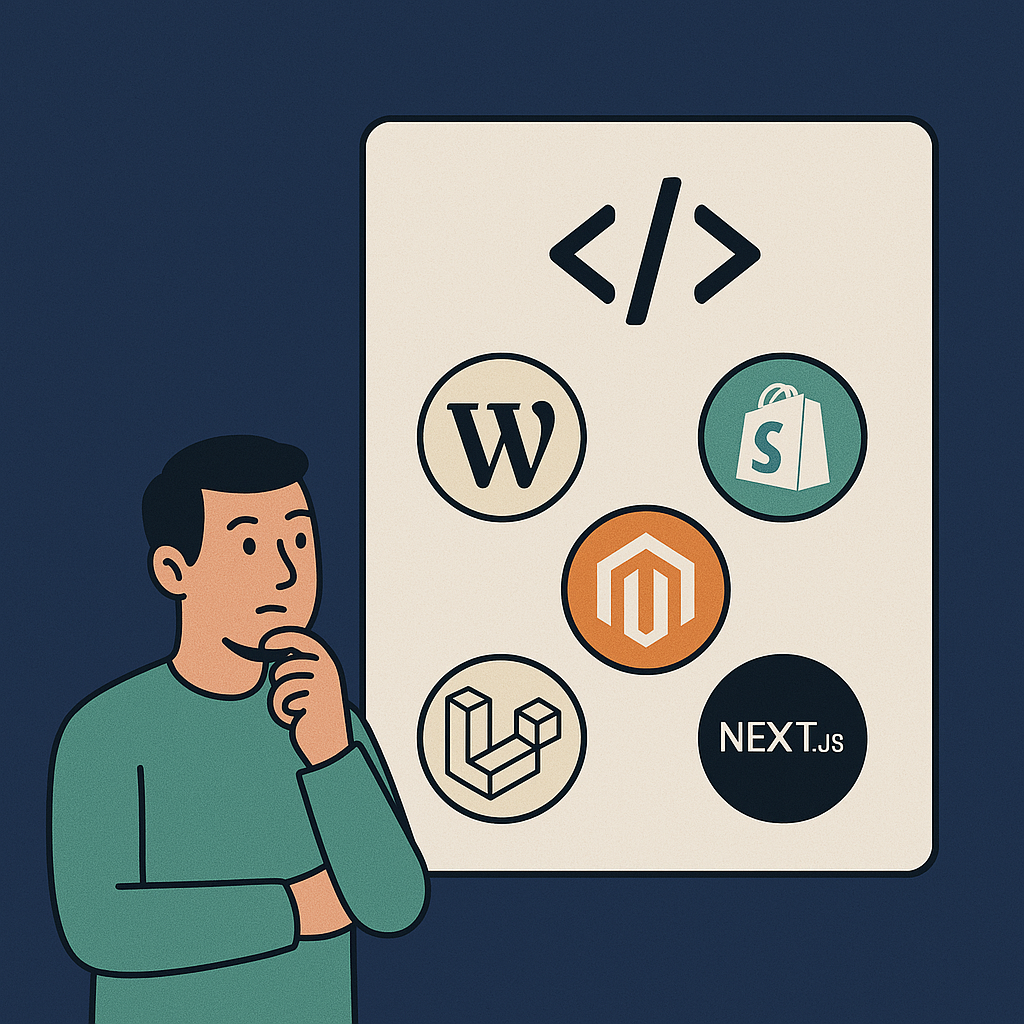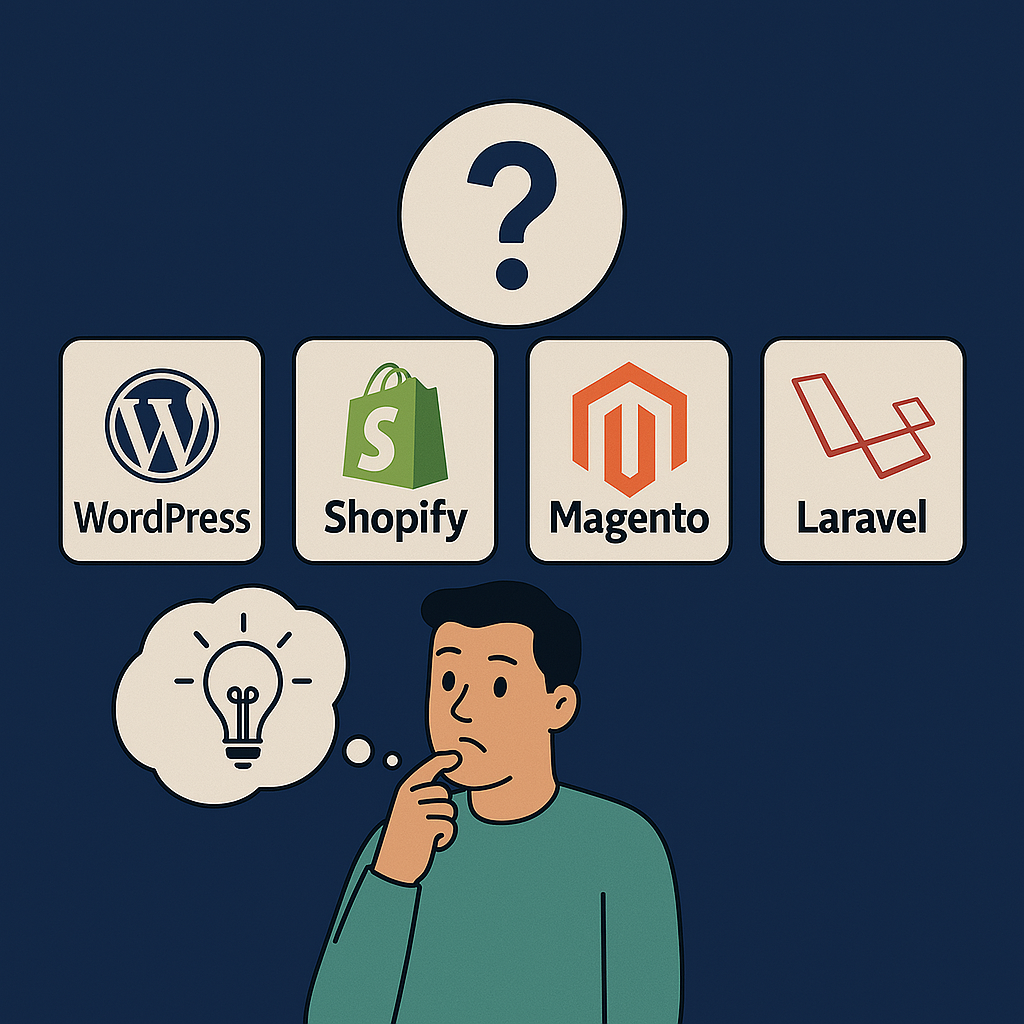Choosing the Best Framework for Your Website: The Ultimate Senior Web Developer's Guide
5 min read

Introduction: Why Choosing the Right Framework Matters
Selecting the best web development framework is a critical decision that affects your website’s performance, scalability, SEO ranking, and user experience. As a senior web developer, understanding the pros and cons of popular frameworks will help you make an informed decision that aligns with your project’s goals.
In this comprehensive guide, we’ll compare five top-performing frameworks: WordPress, Magento, Shopify, Laravel, and Next.js. Each has its own strengths, weaknesses, and ideal use cases, helping you make an informed decision.
WordPress: The King of Content Management - The Best CMS for Content-Driven Websites
Best for:
- Blogs, corporate websites, and content-heavy platforms
- Small to medium-sized businesses
- SEO-optimized websites needing extensive plugin support
Pros:
✅ User-Friendly – Intuitive interface, ideal for beginners and experienced developers alike.
✅ SEO-Optimized – Plugins like Yoast SEO help optimize on-page SEO.
✅ Vast Plugin Library – Extend functionality without deep coding knowledge.
✅ Large Developer Community – Plenty of support, tutorials, and custom solutions.
Cons:
❌ Security Risks – Popularity makes it a target for hackers; regular updates are a must.
❌ Performance Challenges – Can slow down if overloaded with plugins and poorly optimized themes.
❌ Limited Deep Customization – Advanced modifications require PHP and JavaScript expertise.
SEO Tip:
Use lightweight themes, implement caching plugins, and optimize images for better page speed.
Magento: The E-Commerce Powerhouse
Best for:
- Enterprise-level e-commerce businesses
- Stores requiring high scalability and advanced features
Pros:
✅ Highly Scalable – Handles large inventories and complex product catalogs.
✅ Advanced SEO & Marketing Tools – Built-in SEO features enhance ranking potential.
✅ Deep Customization – Extensive options for business-specific needs.
Cons:
❌ Steep Learning Curve – Requires strong PHP expertise.
❌ High Hosting & Maintenance Costs – Resource-heavy platform demands dedicated hosting.
❌ Longer Development Time – Setting up and customizing Magento stores can be time-consuming.
SEO Tip:
Implement CDN caching, minify CSS/JavaScript, and ensure mobile responsiveness to improve performance.
Shopify: The Simplest E-Commerce Solution
Best for:
- Small to medium-sized online businesses
- Entrepreneurs looking for an all-in-one solution
Pros:
✅ No Coding Required – Intuitive drag-and-drop interface.
✅ Fast Setup – Launch an e-commerce store within hours.
✅ Built-in Payment Processing – Supports multiple payment gateways.
✅ Mobile-Optimized Themes – Essential for Google’s mobile-first indexing.
Cons:
❌ Customization Limits – Advanced modifications require Shopify’s Liquid language.
❌ Recurring Costs – Monthly fees + transaction fees if not using Shopify Payments.
❌ Less Control – Bound by Shopify’s policies and ecosystem.
SEO Tip:
Use structured data markup to improve product visibility in search results.
Laravel: The Developer’s Choice for Custom Applications
Best for:
- Highly customized, scalable web applications
- Projects requiring advanced backend logic
Pros:
✅ MVC Architecture – Ensures clean, maintainable code.
✅ Robust Security – Built-in CSRF protection and authentication.
✅ Highly Scalable – Suitable for enterprise-grade applications.
✅ API-Ready – Makes building RESTful APIs easy.
Cons:
❌ Requires PHP Expertise – Not beginner-friendly.
❌ Longer Development Time – Custom builds take more effort than CMS solutions.
❌ Higher Hosting Costs – Requires a dedicated hosting environment.
SEO Tip:
Leverage server-side rendering (SSR) and optimize database queries for faster load times.
Next.js: The Future of High-Performance Web Development
Best for:
- SEO-optimized, high-performance web applications
- Projects needing server-side rendering (SSR) and static generation (SSG)
Pros:
✅ Blazing Fast – Pre-rendering boosts page speed and SEO.
✅ Flexible – Supports static, server-side, and hybrid applications.
✅ Built-in API Routes – Allows full-stack development within the same project.
✅ SEO-Optimized – Google favors SSR and static pages.
Cons:
❌ Development Complexity – Requires React, Node.js, and front-end expertise.
❌ Hosting Considerations – Deployment on Vercel is easy, but scaling large projects requires careful planning.
❌ Not Ideal for Simple CMS Sites – Better suited for web apps over content-heavy sites.
SEO Tip:
Use ISR (Incremental Static Regeneration) to ensure content updates without sacrificing performance.

Conclusion: Which Framework is Right for You?
Choosing the best web development framework depends on your project’s needs:
🔹 For blogs, corporate sites, and content-heavy platforms → Go with WordPress.
🔹 For small to medium e-commerce stores → Shopify is the easiest option.
🔹 For enterprise-level e-commerce → Magento offers top-tier customization and scalability.
🔹 For highly customized web applications → Laravel provides flexibility and backend power.
🔹 For SEO-focused, high-performance web apps → Next.js is the best choice.
Final Tip:
Regardless of the framework, mobile responsiveness, page speed, structured data, and security are key factors for SEO success. Optimize your core web vitals, use schema markup, and keep your codebase clean to improve rankings.
🚀 Ready to Build a High-Performance Website?
Need expert guidance on choosing the right framework? Contact us today and let’s build something amazing together!